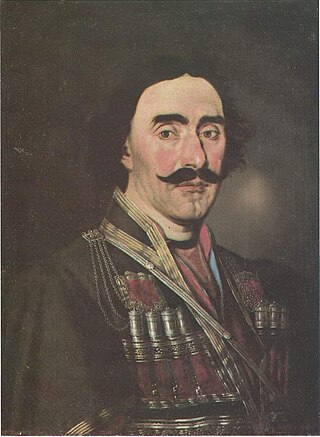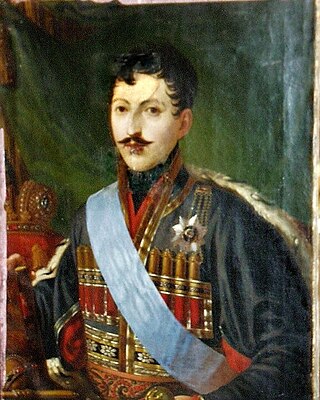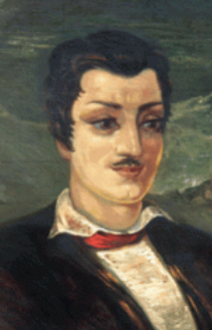
Sayat-Nova was an Armenian poet, musician and ashugh, who had compositions in a number of languages.

Solomon I the Great, of the Bagrationi Dynasty, was King of Imereti from 1752 to 1765 and again from 1767 until his death in 1784.
The Battle of Aspindza was fought on 20 April 1770 between the Georgians, led by king of Kartli-Kakheti Erekle II, and the Ottoman Empire. The Georgians won a victory over the Turks.
Vakhtang V, born Bakhuta Mukhranbatoni, was King of Kartli from 1658 until his death, who ruled as a vassal wali for the Persian shah. He is also known under the name of Shah Nawaz, which he assumed on being obliged outwardly to conform to Islam.

Teimuraz II (1680/1700–1762) of the Bagrationi dynasty, was a king of Kakheti, eastern Georgia, from 1732 to 1744, then of Kartli from 1744 until his death. Teimuraz was also a lyric poet.

Prince Nikoloz "Tato" Baratashvili was a Georgian poet. He was one of the first Georgians to marry modern nationalism with European Romanticism and to introduce "Europeanism" into Georgian literature. Due to his early death, Baratashvili left a relatively small literary heritage of fewer than forty short lyrics, one extended poem, and a few private letters, but he is nevertheless considered to be the high point of Georgian Romanticism. He was referred to as the "Georgian Byron".

The Bagrationi dynasty is a royal dynasty which reigned in Georgia from the Middle Ages until the early 19th century, being among the oldest extant Christian ruling dynasties in the world. In modern usage, the name of the dynasty is sometimes Hellenized and referred to as the Georgian Bagratids, also known in English as the Bagrations.
David Orbeliani, monikered David "the General" was a Georgian military figure, politician, translator, and a poet of some talent.

Prince Grigol Orbeliani or Jambakur-Orbeliani was a Georgian Romanticist poet and general in Imperial Russian service. One of the most colorful figures in the 19th-century Georgian culture, Orbeliani is noted for his patriotic poetry, lamenting Georgia's lost independence and the deposition of the Royal House of Bagration. At the same time, he spent decades in the Imperial Russian Army, rising to the highest positions in the imperial administration in the Caucasus.

David II, of the Bagrationi dynasty, was King of Imereti from 1784 to 1789 and from 1790 to 1791.

Teimuraz I (1589–1663), of the Bagrationi dynasty, was a Georgian monarch who ruled, with intermissions, as King of Kakheti from 1605 to 1648 and also of Kartli from 1625 to 1633. The eldest son of David I and Ketevan, Teimuraz spent most of his childhood at the court of Shah of Iran, where he came to be known as Tahmuras Khan. He was made king of Kakheti following a revolt against his reigning uncle, Constantine I, in 1605. From 1614 on, he waged a five-decade long struggle against the Safavid Iranian domination of Georgia in the course of which he lost several members of his family and ended up his life as the shah's prisoner at Astarabad at the age of 74.

Count Alexander Orbeliani (Jambakur-Orbeliani) was a Georgian Romanticist poet, playwright, journalist and historian, of the noble House of Orbeliani.

Prince Vakhtang Orbeliani was a Georgian Romanticist poet and soldier in the Imperial Russian service, of the noble House of Orbeliani.

Timote (Timothy) Gabashvili (1703–1764) was a Georgian travel writer, traveler, diplomat, cartographer, religious and public figure. He was the first to describe the Georgian antiquities of Jerusalem on his visit to the Holy Land in the 1750s. Timote Gabashvili was a highly educated Georgian figure who was well versed in philosophy, theology and the history of religion. He also knew Russian, Greek and Turkish. Author of an essay in the memoir genre - "Mimosvla", which provides historical, ethnographic, geographical information.
Elene was a Georgian princess royal (batonishvili), a daughter of Heraclius II, King of Kartli and Kakheti. She was the mother of Solomon II of Imereti, the last king to have reigned in the Georgian polities.

Anton I, born as Teimuraz Bagrationi, was the Catholicos–Patriarch of the Georgian Orthodox Church in the period 1744–1755 and again in 1764–1788.
Davit Aleksidze-Meskhishvili, "the Rector", was a Georgian pedagogue, calligrapher, and rector of the Telavi seminary from 1790 to 1801.

Ana Orbeliani was a Queen Consort of the western Georgian kingdom of Imereti as the wife of King David II. After David's deposition and death in exile in 1795, Ana tried to secure succession for her son Constantine during the reign of Solomon II, who had supplanted her husband. In her efforts, Ana relied on the Russian Empire, which eventually annexed Imereti in 1810. Ana spent the rest of her life in Russia, where she was known as tsaritsaAnna Matveyevna Imeretinskaya.

1832 Georgian plot was a political conspiracy involving Georgian royalty and nobility to restore Georgian statehood and its Bagrationi monarchy through an assassination of the Russian imperial administration.















